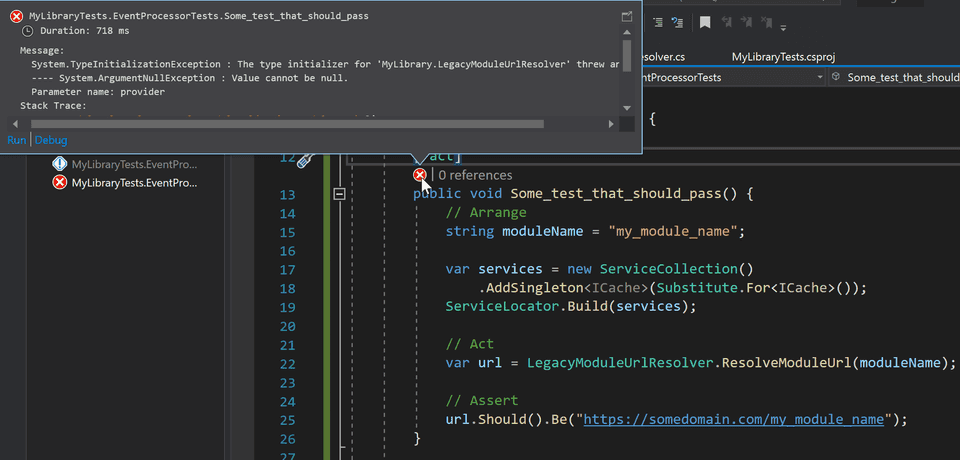C# Static fields inline initialization - Be Lazy
✅ The root cause of the failing test
In my previous post I have described the troubleshooting experience of a failed unit test in CI/CD pipeline which was passing on my machine. Today I want to explore what was causing the failure when the test was running in Release mode, and passing when running in Debug mode.
Basically the root cause was a static field inline initialization that was being initialized before some condition to happen.
✂️ Explaining the issue with a simple scenario
Let’s imagine that we have the following implementation in a class with the responsibility to resolve some URLs.
public class UrlResolver : IUrlResolver {
private readonly ICache cache;
public UrlResolver(ICache cache) {
this.cache = cache ?? throw new ArgumentNullException(nameof(cache));
}
public string ResolveUrl(string moduleName) {
var cacheKey = $"{moduleName}_url_cache_key";
string moduleUrl = cache.Get(cacheKey) as string;
if (moduleUrl == null) {
moduleUrl = ResolveUrlInternal(moduleName);
cache.Set(cacheKey, moduleUrl);
}
return moduleUrl;
}
private string ResolveUrlInternal(string moduleName) {
return $"https://somedomain.com/{moduleName}";
}
}In the context of an ASP.NET Core application, this class is used inside
controllers and it is being injected in its constructors as an
IUrlResolver. We are registering these services in the Startup class, and
everything works as expected.
services.AddSingleton<ICache, MyCacheImplementation>();
services.AddSingleton<IUrlResolver, UrlResolver>()The point here is that the UrlResolver has a dependency of a ICache and it
requires an implementation of it. Otherwise we are not able to create an
instance of a UrlResolver due the following code in its constructor.
public UrlResolver(ICache cache) {
this.cache = cache ?? throw new ArgumentNullException(nameof(cache));
}🦹 Now the legacy code
Now let’s imagine that we have some legacy code that has some static public
methods that need need to consume an instance of a UrlResolver. Since these
methods are static, one option is to use a static field to keep the
UrlResolver instance. But to create an instance of it, we need to pass an
instance of an ICache. This legacy code is using a Service Locator pattern
to resolve instances of specific services, including the cache service. So, we
could do something like this
public static class LegacyModuleUrlResolver {
private static readonly IUrlResolver urlResolver
= new UrlResolver(ServiceLocator.GetCache());
public static string ResolveModuleUrl(string moduleName) {
return urlResolver.ResolveUrl(moduleName);
}
}This code is assuming that when we create the UrlResolver we have an instance of
ICache being returned by the Service Locator. Again. In the context of an
ASP.NET Core, everything works fine becasue the Service Locator is being initialized
and built during the Startup. So, what is the chance of passing a null reference of
ICache when creating the static field?. Very unlikely.
👎 And now the failing test
Now, let’s imagine the following test.
[Fact]
public void Some_test_that_should_pass() {
// Arrange
string moduleName = "my_module_name";
var services = new ServiceCollection()
.AddSingleton<ICache>(Substitute.For<ICache>());
ServiceLocator.Build(services);
// Act
var url = LegacyModuleUrlResolver.ResolveModuleUrl(moduleName);
// Assert
url.Should().Be("https://somedomain.com/my_module_name");
}What do you think? Does it pass? Or does it fail? Well, it really depends of the target framework and configuration. For example, in .NET Core 3.1 the test passes in both Debug and Release mode. In .NET 4.7.2, the test passes in Debug mode, but it fails in Release (exactly the behavior I got in CI/CD pipeline issue).
The main question here is: in what moment the static field inline
initialization runs? We should only assume that it will run
before it’s needed. But we can’t control when the CLR will run
the static initialization. And if the initialization fails due a null instance
of ICache, the type will get unused for the whole application with a
TypeInitializationException and doesn’t recover from this state, which is not good.
If we use a static constructor the results are consistent and the test starts succeeding in all configurations. But again, we can’t control when the CLR will call the static constructor. We just know that it will run before it’s needed.
👍 Let’s have full control and be lazy
When having these scenarios of depending of some services during the
initialization, we may want to have full control when the initialization
happens, and we want to initialize just before we really need it (being really
really lazy). We can use a different approach with a
Lazy<T>.
public static class LegacyModuleUrlResolver {
private static readonly Lazy<IUrlResolver> urlResolver =
new Lazy<IUrlResolver>(
() => new UrlResolver(ServiceLocator.GetCache()),
LazyThreadSafetyMode.PublicationOnly);
public static string ResolveModuleUrl(string moduleName) {
return urlResolver.Value.ResolveUrl(moduleName);
}
}By using a Lazy<T> we have full control when the initialization will happen.
In this case the initialization will occur the first time the static method
ResolveModuleUrl is called, when evaluating the Value property of the lazy
instance of urlResolver. I am also using the option
LazyThreadSafetyMode.PublicationOnly
to not cache the exception if for some reason the initialization fails, to
prevent the TypeInitializationException described earlier.
This was a simple explanation why the test was failing. In reality the test was much more complex, involving several assemblies provided by several nuget packages. One of the methods in the test was swallowing exceptions, so it was being completely silence, and the test was failing due an assert. This made the diagnostics even harder. Net-net, sometimes it’s good to have full control when things happen and to be lazy in initialization until we really need it.

